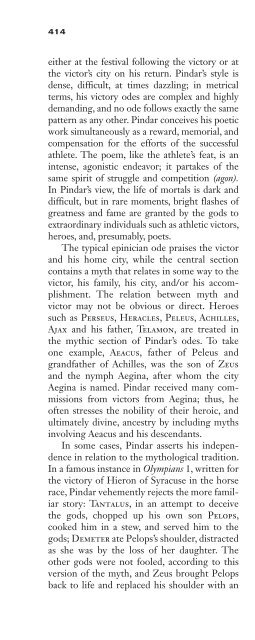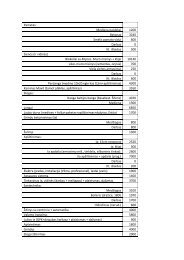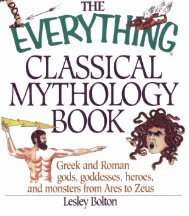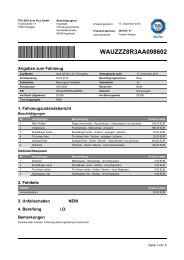Encyclopedia of Greek and Roman Mythology (Facts on File Library ...
Encyclopedia of Greek and Roman Mythology (Facts on File Library ...
Encyclopedia of Greek and Roman Mythology (Facts on File Library ...
Create successful ePaper yourself
Turn your PDF publications into a flip-book with our unique Google optimized e-Paper software.
either at the festival following the victory or at<br />
the victor’s city <strong>on</strong> his return. Pindar’s style is<br />
dense, difficult, at times dazzling; in metrical<br />
terms, his victory odes are complex <str<strong>on</strong>g>and</str<strong>on</strong>g> highly<br />
dem<str<strong>on</strong>g>and</str<strong>on</strong>g>ing, <str<strong>on</strong>g>and</str<strong>on</strong>g> no ode follows exactly the same<br />
pattern as any other. Pindar c<strong>on</strong>ceives his poetic<br />
work simultaneously as a reward, memorial, <str<strong>on</strong>g>and</str<strong>on</strong>g><br />
compensati<strong>on</strong> for the efforts <str<strong>on</strong>g>of</str<strong>on</strong>g> the successful<br />
athlete. The poem, like the athlete’s feat, is an<br />
intense, ag<strong>on</strong>istic endeavor; it partakes <str<strong>on</strong>g>of</str<strong>on</strong>g> the<br />
same spirit <str<strong>on</strong>g>of</str<strong>on</strong>g> struggle <str<strong>on</strong>g>and</str<strong>on</strong>g> competiti<strong>on</strong> (ag<strong>on</strong>).<br />
In Pindar’s view, the life <str<strong>on</strong>g>of</str<strong>on</strong>g> mortals is dark <str<strong>on</strong>g>and</str<strong>on</strong>g><br />
difficult, but in rare moments, bright flashes <str<strong>on</strong>g>of</str<strong>on</strong>g><br />
greatness <str<strong>on</strong>g>and</str<strong>on</strong>g> fame are granted by the gods to<br />
extraordinary individuals such as athletic victors,<br />
heroes, <str<strong>on</strong>g>and</str<strong>on</strong>g>, presumably, poets.<br />
The typical epinician ode praises the victor<br />
<str<strong>on</strong>g>and</str<strong>on</strong>g> his home city, while the central secti<strong>on</strong><br />
c<strong>on</strong>tains a myth that relates in some way to the<br />
victor, his family, his city, <str<strong>on</strong>g>and</str<strong>on</strong>g>/or his accomplishment.<br />
The relati<strong>on</strong> between myth <str<strong>on</strong>g>and</str<strong>on</strong>g><br />
victor may not be obvious or direct. Heroes<br />
such as Perseus, Heracles, Peleus, Achilles,<br />
Ajax <str<strong>on</strong>g>and</str<strong>on</strong>g> his father, Telam<strong>on</strong>, are treated in<br />
the mythic secti<strong>on</strong> <str<strong>on</strong>g>of</str<strong>on</strong>g> Pindar’s odes. To take<br />
<strong>on</strong>e example, Aeacus, father <str<strong>on</strong>g>of</str<strong>on</strong>g> Peleus <str<strong>on</strong>g>and</str<strong>on</strong>g><br />
gr<str<strong>on</strong>g>and</str<strong>on</strong>g>father <str<strong>on</strong>g>of</str<strong>on</strong>g> Achilles, was the s<strong>on</strong> <str<strong>on</strong>g>of</str<strong>on</strong>g> Zeus<br />
<str<strong>on</strong>g>and</str<strong>on</strong>g> the nymph Aegina, after whom the city<br />
Aegina is named. Pindar received many commissi<strong>on</strong>s<br />
from victors from Aegina; thus, he<br />
<str<strong>on</strong>g>of</str<strong>on</strong>g>ten stresses the nobility <str<strong>on</strong>g>of</str<strong>on</strong>g> their heroic, <str<strong>on</strong>g>and</str<strong>on</strong>g><br />
ultimately divine, ancestry by including myths<br />
involving Aeacus <str<strong>on</strong>g>and</str<strong>on</strong>g> his descendants.<br />
In some cases, Pindar asserts his independence<br />
in relati<strong>on</strong> to the mythological traditi<strong>on</strong>.<br />
In a famous instance in Olympians 1, written for<br />
the victory <str<strong>on</strong>g>of</str<strong>on</strong>g> Hier<strong>on</strong> <str<strong>on</strong>g>of</str<strong>on</strong>g> Syracuse in the horse<br />
race, Pindar vehemently rejects the more familiar<br />
story: Tantalus, in an attempt to deceive<br />
the gods, chopped up his own s<strong>on</strong> Pelops,<br />
cooked him in a stew, <str<strong>on</strong>g>and</str<strong>on</strong>g> served him to the<br />
gods; Demeter ate Pelops’s shoulder, distracted<br />
as she was by the loss <str<strong>on</strong>g>of</str<strong>on</strong>g> her daughter. The<br />
other gods were not fooled, according to this<br />
versi<strong>on</strong> <str<strong>on</strong>g>of</str<strong>on</strong>g> the myth, <str<strong>on</strong>g>and</str<strong>on</strong>g> Zeus brought Pelops<br />
back to life <str<strong>on</strong>g>and</str<strong>on</strong>g> replaced his shoulder with an<br />
Pirithous<br />
ivory <strong>on</strong>e. Pindar expresses moral indignati<strong>on</strong><br />
at the idea that Demeter would have glutt<strong>on</strong>ously<br />
devoured Pelops’s shoulder. He admits<br />
that Tantalus was punished by the gods, but<br />
for stealing the gods’ nectar <str<strong>on</strong>g>and</str<strong>on</strong>g> ambrosia, not<br />
for serving them his murdered s<strong>on</strong>. Pelops,<br />
moreover, was shown divine favor in a different<br />
way: Poseid<strong>on</strong> became enamored <str<strong>on</strong>g>of</str<strong>on</strong>g> him <str<strong>on</strong>g>and</str<strong>on</strong>g><br />
swept him <str<strong>on</strong>g>of</str<strong>on</strong>g>f to the home <str<strong>on</strong>g>of</str<strong>on</strong>g> the gods, just as<br />
Zeus abducted Ganymede. Pindar goes <strong>on</strong> to<br />
tell how Pelops fell in love with Hippodamia<br />
<str<strong>on</strong>g>and</str<strong>on</strong>g> defeated her father, Oenomaus, in a chariot<br />
race, thereby winning her h<str<strong>on</strong>g>and</str<strong>on</strong>g>. Pindar makes<br />
no menti<strong>on</strong> <str<strong>on</strong>g>of</str<strong>on</strong>g> the usual story, in which Pelops<br />
bribes <str<strong>on</strong>g>and</str<strong>on</strong>g> later murders Oenomaus’s charioteer.<br />
Instead, Pelops wins the race through<br />
Poseid<strong>on</strong>’s gift <str<strong>on</strong>g>of</str<strong>on</strong>g> horses. The myth <str<strong>on</strong>g>of</str<strong>on</strong>g> Pelops,<br />
then, is refashi<strong>on</strong>ed to stress his status as a hero<br />
favored by the gods <str<strong>on</strong>g>and</str<strong>on</strong>g> to remove the taint<br />
<str<strong>on</strong>g>of</str<strong>on</strong>g> moral turpitude. In general, although not<br />
always, Pindar stresses the glories <str<strong>on</strong>g>and</str<strong>on</strong>g> triumphs<br />
<str<strong>on</strong>g>of</str<strong>on</strong>g> heroes in keeping with his glorificati<strong>on</strong> <str<strong>on</strong>g>of</str<strong>on</strong>g><br />
athletic victory.<br />
Pirithous (Peirithous) A Lapith. S<strong>on</strong> <str<strong>on</strong>g>of</str<strong>on</strong>g> Zeus<br />
<str<strong>on</strong>g>and</str<strong>on</strong>g> Dia (Ixi<strong>on</strong>’s wife), or s<strong>on</strong> <str<strong>on</strong>g>of</str<strong>on</strong>g> Ixi<strong>on</strong> <str<strong>on</strong>g>and</str<strong>on</strong>g> Dia.<br />
Classical sources are Apollodorus’s <strong>Library</strong> (1.8.2,<br />
2.5.12), Diodorus Siculus’s <strong>Library</strong> <str<strong>on</strong>g>of</str<strong>on</strong>g> History<br />
(4.63), Homer’s iLiad (2.740–744, 14.317–318)<br />
<str<strong>on</strong>g>and</str<strong>on</strong>g> odyssey (11.630–631), Hyginus’s Fabulae<br />
(33, 79), Ovid’s MetaMorpHoses (12.210–535),<br />
<str<strong>on</strong>g>and</str<strong>on</strong>g> Pausanias’s Descripti<strong>on</strong> <str<strong>on</strong>g>of</str<strong>on</strong>g> Greece (1.2.1, 1.17.4,<br />
2.22.6). Pirithous generally enters mythological<br />
stories as the compani<strong>on</strong> <str<strong>on</strong>g>of</str<strong>on</strong>g> Theseus. Their<br />
friendship was proverbial, like the friendship <str<strong>on</strong>g>of</str<strong>on</strong>g><br />
Pylades <str<strong>on</strong>g>and</str<strong>on</strong>g> Orestes. Thus he participated in<br />
Theseus’s abducti<strong>on</strong> <str<strong>on</strong>g>of</str<strong>on</strong>g> Helen, the Calyd<strong>on</strong>ian<br />
Boar hunt, <str<strong>on</strong>g>and</str<strong>on</strong>g> the war with the Amaz<strong>on</strong>s. When<br />
Pirithous married Hippodamia, the centaurs<br />
were invited, presumably because <str<strong>on</strong>g>of</str<strong>on</strong>g> their descent<br />
from Ixi<strong>on</strong>; they became drunk <str<strong>on</strong>g>and</str<strong>on</strong>g> attempted to<br />
rape Hippodamia. A battle between the Lapiths<br />
<str<strong>on</strong>g>and</str<strong>on</strong>g> centaurs broke out, narrated with comic relish<br />
by Ovid (Metamorphoses 12), <str<strong>on</strong>g>and</str<strong>on</strong>g> the Lapiths<br />
w<strong>on</strong>. Theseus accompanied Pirithous to the







